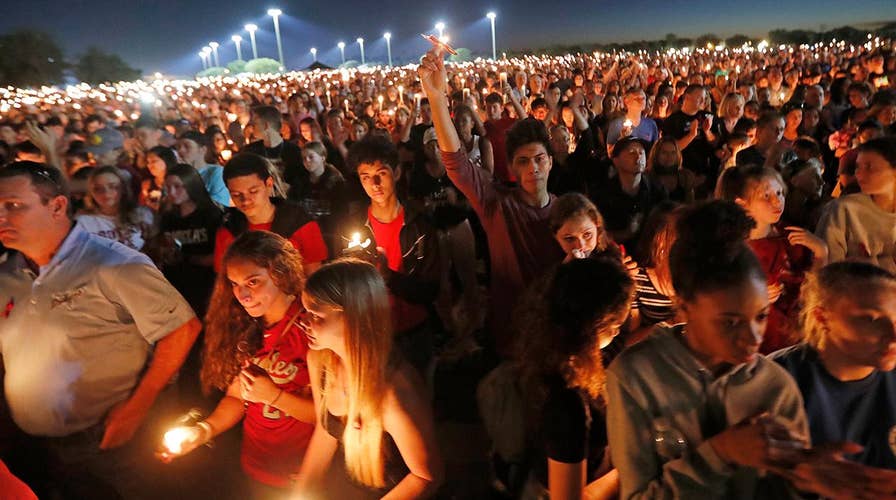Parkland, Florida community holds a candle light vigil
New details emerge about the Parkland gunman's exact timeline.
In the wake of the tragic recent shooting deaths of 14 students and three adults at a Florida high school, we see a familiar ritual being played out: an angry debate about guns.
What you never see is the debate we really should be having: about the social breakdown that’s been going on in America and most developed countries for the past few decades. This breakdown has many forms: our torn social fabric, the loss of a sense of community and neighborliness, and falling trust in each other and in our shared institutions.
But at the heart of it is the most important social change of all – the biggest issue that Americans refuse to talk about: family breakdown.
It is now well established that Nikolas Cruz – who authorities say has confessed to the Florida school shootings – had a deeply troubled and unstable family background, a characteristic he has in common with many who have committed such atrocities.
But we cannot and should not blame Cruz’s family circumstances for what he has confessed to doing. In the end, individuals must be held responsible for their own actions.
Family policy is the single most important issue to get right. Strong families are the foundation of a strong, prosperous society. That makes family a populist issue. But it shouldn’t be a partisan one.
It’s important to remember that the majority of violent deaths in America – whether by guns or other means – are not caused by evil psychopaths. They are caused by individuals who are troubled in more mundane ways, and whose unstable family backgrounds are an instrumental factor in risky behavior, like joining a gang.
The deeper point is to understand that this is much bigger than just crime. More and more children in America are growing up in broken homes and in a culture of toxic stress and violence.
Most of these children will never commit a crime. But many will end up living in poverty. Suffering addiction. Or homelessness, or debt, or persistent unemployment – or a combination of these things – trapping them in lives without any of the opportunities that others take for granted.
The causal connection between family breakdown and the intractable social issues that form the core of our political debates – taxes and government spending, inequality, crime – is well researched and well established. The science is in. It’s just that we don’t want to confront it because it means confronting something that is very personal to each of us: how we choose to live our lives.
The elephant in the room is marriage. The data shows clearly that on average, children who are raised in stable homes with both parents do better. Children from divorced parents, or whose parents never married in the first place, do worse – whether that’s in terms of lower levels of social mobility or higher levels of poverty.
Of course, averages have exceptions to them. Many children from broken homes do well. I’m one of them.
But that shouldn’t blind us to the overall picture. A few decades ago, over 90 per cent of children were born to married parents. Today it’s less than half. Liberals and conservatives alike should be able to agree that it would be better for our society – and our economy, frankly – if we could turn things around.
Family policy is the single most important issue to get right. Strong families are the foundation of a strong, prosperous society. That makes family a populist issue. But it shouldn’t be a partisan one.
If your focus is individual freedom and reducing the size and scope of government, it’s not enough to cut things back and hope for the best. You have to actually solve the social problems that give rise to so much of what government does and what it spends so much money on.
If your focus is social justice and reducing poverty and inequality, it is now evident that spending money on these problems is not enough. We’ve been doing that from the New Deal in the 1930s through to the Great Society in the 1960s and beyond. If anything, the problems are worse, not better. The fight needs to be taken to the underlying causes of poverty and inequality.
Whichever way you look at it, you end up in the same place: the family. The single best thing we can do to increase opportunity, raise incomes, build a fairer society, fight crime and drug addiction, improve health, reduce welfare – you name it – is to try to make sure that every child in America is raised in a stable, loving home.
We will be debating all this and more on “The Next Revolution” this Sunday at 9 p.m. EST on Fox News Channel – hope you can join us!










































